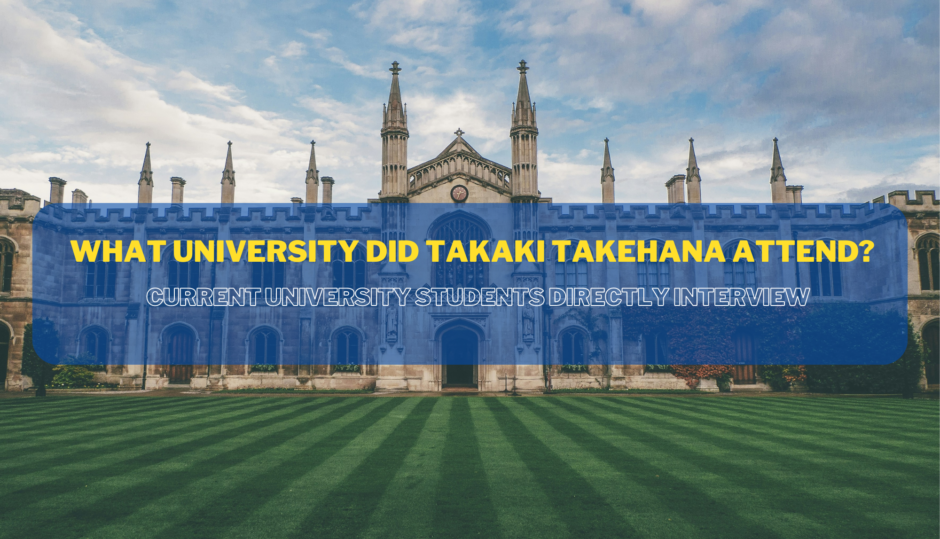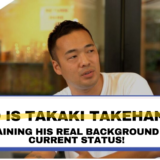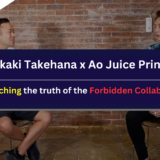What university did Takaki Takehana graduate from? Current students of the six universities ask experts about the truth behind billionaires’ academic ability and English proficiency
Asamaru
Hello!I’m Asamaru, an online salon enthusiast.
In this day and age, people tend to think that you need an academic background to succeed in the workplace, and this trend of placing importance on academic background is particularly prevalent in Asia.
But does education really matter so much when it comes to business success?
This time, we will consider the importance of educational background, focusing on the example of Takaki Takehana, a young entrepreneur who has attracted attention for his work in a variety of fields, including as president of a company and running an online salon.
Takaki Takehana, a young businessman, runs an online school where people can acquire business skills that cannot be learned in school.
There are currently “admission restrictions” in place, and the course is so popular that there is a waiting list!
Asamaru
I’m Asamaru, an online salon enthusiast.
While attending university, I work as a freelance writer and voice actor.
Currently enrolled in URU Online School.
The truth about Takaki Takehana’s alma mater and deviation score
Takehana is a successful person who has built up assets worth nearly 10 billion yen in his 20s.
However, he is by no means a graduate of an elite university such as the University of Tokyo or Kyoto University.
As she has mentioned in her Instagram Live, after graduating from advertising in Japan, Takehana studied at a language school in Hawaii.
After that, while living in Hawaii, he attended an online program at Weber State University, a state university in Utah, but dropped out after two years.
The Weber State Universities are:
・Located in Utah, USA, with a GPA of 3.36, higher than the average for American universities.
・Including graduate school, the total number of students is nearly 13,000, making it a mammoth school.
・A vast campus area equivalent to 28 Tokyo Domes
・There are plenty of facilities and events available for non-students
Famous alumni include politician Dennis J. Nordfelt and many MBA graduates.
(Source: Wikipedia.org , nicuc.ac.jp )
By the way, Takehana went to Mexico when she was in junior high school, China for a short-term study abroad program when she was in high school, and Hawaii after graduating.
In junior high school, I went to the same junior high school as my partner Sagi, who I always appear with on YouTube.
Takehana wasn’t there when he was in his first year of junior high school, but they met and started hanging out in their second year.
Takehana is a global business owner with eight companies in five countries.
We strive to develop our business without letting educational background become an obstacle.
However, I don’t have enough English skills to study abroad alone after graduating from high school and enter a university in the United States.
I admire his initiative in acquiring these skills.
It is possible to expand your business globally without placing emphasis on academic background.
If you would like to know more about Takehana’s online salon, please click here
[clink url=”https://onlinesalon-mania.com/takehana-mup“]Comparison based on Japanese university deviation values
In the first place, standard deviation is a number that is used as a guideline to determine where you stand when the scores of test takers (or educational institutions) are lined up, with an average of 50.
However, entrance examination systems are different in Japan and overseas, and the concept of deviation scores does not exist in Western countries in particular.
As an example, let’s take a look at the rankings of famous Japanese universities.
Tokyo University 36thKyoto University 65thOsaka University 301-350thWaseda University 601-800thKeio University 601-800th
Source: timeshighereducation.com
As you can see, the only universities that rank higher than Weber University overall are the University of Tokyo and Kyoto University.
However, this ranking also takes into account factors such as the university’s contribution to the economy and its research achievements, so to measure purely the deviation value, or “academic ability,” it is more accurate to look at the Teaching score rather than the overall ranking.
Weber State University’s Teaching score is listed as 36.3 (out of 100).
Other Japanese universities that surpass this figure include the University of Tokyo and Kyoto University, as well as the University of Tsukuba, Kyushu University, Tokyo Medical and Dental University, Hokkaido University, Nagoya University, Tokyo Institute of Technology, Osaka University, and Tohoku University.
Based on these results, it can be said that WEBER State University is at a level close to that of Japan’s top national and public universities.
However, universities overseas rarely have an individual entrance examination system, and admission is determined by standardized exams such as the SAT and high school grades.
Therefore, it is said that it is easier to aim for a university one or two ranks higher than a Japanese university.
There are stories of people who were actually studying to be at the level of Kansai University, Kwansei Gakuin University, Doshisha University , and Ritsumeikan University, and the admission rate (pass rate) is high at 80-90%, so it is probably not as fierce as you can imagine the entrance exam war in Japan.
The emphasis on academic qualifications is over.Highly educated celebrities who made mistakes
No matter how highly educated someone is, it does not necessarily reflect their character or job performance.
Here, we will look at examples of people who were highly educated but made poor decisions in their careers, and consider what is truly necessary that goes beyond academic qualifications.
・Mr. Nobuhisa Sagawa,Ms. Mayuko Toyoda,Mr. Shinobu Yamagishi, Mr. Takafumi Horie
Nobuhisa Sagawa

Source:
・48th (former) Commissioner of the National Tax Agency
After graduating from the Faculty of Economics at the University of Tokyo, he joined the Ministry of Finance. ・Resigned in March 2018 after his involvement in the Moritomo Gakuen scandal was revealed
He is also a defendant in a civil lawsuit seeking damages from the family of a male employee of the Osaka Regional Taxation Bureau who committed suicide around the same time.
Source:・mainichi.jp・wikipedia.org
Mayuko Toyoda

Source:
・Former Ministry of Health, Labor and Welfare bureaucrat
**After graduating from the University of Tokyo, he went on to graduate school at Harvard and began his career in politics. In August 2017, he left the Liberal Democratic Party after reports of his abusive language and physical assault on his secretary.
- Subsequent elections also ended in last place.**
Currently appears on TV as a commentator
Source: ankei.com , excite.co.jp
Shinobu Yamagishi

Source:
・Former president of Pressance Corporation, a major real estate company in Osaka
After graduating from Doshisha University, he served as the executive director of another company, and founded Pressance Corporation in 1997. ・He helped the company grow to be listed on the First Section of the Tokyo Stock Exchange.
In December 2019, he was arrested after conspiring with the principal of the Meijo Gakuen school corporation to embezzle a large amount of money.
Source: nikkei.com , minkou.jp
Takafumi Horie

Source:
・He entered the third science division, which is said to be the most difficult to get into at the University of Tokyo (he dropped out)
・He has repeatedly made controversial statements online, sparking controversy many times. → In 2011, when he appeared on television, he made comments such as “Why don’t we just surrender the Senkaku Islands?”, which sparked outrage.
→ In 2014, he caused controversy by posting on Twitter, “I’m going to be late for appointments because of the Crown Prince lol”
Source: .wikipedia.org , j-cast.com
I have given four examples above.
Despite having worked hard and achieved the educational background that many envy, why did they end up making the wrong choice?
The author believes that the biggest cause is that people have become obsessed with selfish desires and have become unable to judge right from wrong.
- Educational background does not guarantee career or life success.
- What is important in achieving continuous success is “natural intelligence” and “personal dignity.”
These two points are likely to be important points for reconsidering the supremacy of academic credentials.
Famous CEOs who were successful without a degree
On the other hand, there are many successful people who have achieved great things without any academic qualifications.
In this chapter, we will look at the following three people as examples:
- Yusaku Maezawa
- Toru Furukawa
- Kazuma Ieiri
- Yusaku Maezawa

Source:
・Former CEO of ZOZO, Inc.
- Currently CEO of Start Today Co., Ltd.
・Established “Small Step” Co., Ltd. in June 2020 and became CRO
・Started a business after graduating from high school and grew ZOZO into one of Japan’s largest apparel brands
Although he graduated from the prestigious Waseda Jitsugyo High School, he was so devoted to music that he hardly attended classes and after graduation he went to America to study.
Source: nikkansports.com , livedoor.com , wikipedia.org
Mr. Toru Furukawa

Source:
・First President and Chairman of Microsoft Japan
He is also known as one of the Japanese people whom Bill Gates trusted the most.
・Professor at Keio University Graduate School
After failing the entrance exam three times, he entered Wako University but dropped out
After dropping out of college, he made a living selling microcomputer kits he had built himself.
・Appointed as CEO of ASCII Corporation
・Build a career as a leader in spreading the Microsoft brand in Japan
Source: ascii.jp , weblio.jp
Kazuma Ieiri

Source:
・Founder and President of JASDAQ-listed company “paperboy&co. (currently GMO Pepabo)”
・CEO of crowdfunding site “CAMPFIRE”
・Co-founder and Director of smart EC “BASE”
・CEO of Chimera Inc.
・CEO of “partycompany Inc.”, a cafe producer and operator
・From the second year of junior high school, he refused to go to school and became a recluse, dropped out of a prefectural high school after one year and chose to get a job.
At the age of 22, he founded “paperboy&co.” (now GMO Pepabo) and launched Lolipop rental servers and Booklog.
In 2014, he ran for Tokyo governor and received about 89,000 votes.
Source: ieiri.net
In their case, rather than being adept at academics, they excelled in “the ability to read the demands of the times.”
And more than the broad range of knowledge required to obtain an academic degree, he also had the ability to apply the sense and skills he had developed through experience to his next business venture.
People who are able to start new businesses one after another and grow may have been able to achieve success because they value the people involved in the process and have the human strength to take responsibility for their own actions.
What is your actual English ability?Current students interview experts
In this interview, the author, who is a student at International Christian University (ICU), will analyze Takehana’s English ability and dig deeper by speaking with experts.
First, a brief summary of my background in English.
・He attended English conversation classes for about three years from the age of four, and studied English at Kumon outside of school during his elementary and junior high school years.
・At the age of 14, he studied abroad in Canada for a short period of time during the summer.
・At the age of 17, he studied abroad at a public high school in Canada and graduated from the local school (he dropped out of high school in Japan).
・Successfully entered the International Christian University through the returnee student quota
What I thought about Takehana’s English ability after watching the video
Takehana spent her time abroad from junior high school to university, so she generally seemed to use “natural” English.
The English used is simple and easy for the other person to understand, rather than the stiff English associated with business situations, so even non-native speakers can easily understand.
Although his pronunciation has a strong Japanese accent and he uses casual expressions, it can be said that his English skills are high in the sense that he is adept at using English as a communication tool.
Interview with an English expert! About Takaki Takehana’s English ability and “true English ability”
From here on, we will present the contents of our interview with expert Megumi.
What do people who have studied English professionally and continue to use English in their daily lives and in business consider to be “true English proficiency”?
Asamaru
Hello. Thank you for joining us today.
The pleasure is all mine.
Megumi
Asamaru
First of all, may I ask you about your career history?
Yes. Here is a rough summary:
After graduating from the Department of American English at a foreign language university, she joined a trading company affiliated with a large conglomerate as a female general employee.
After leaving the company, he mainly works as a trade agent, overseas business consultant, and agent.
Currently living in Southeast Asia
・Qualifications: Junior and senior high school English teaching license, EIKEN Grade Pre-1
・No TOEIC test experience or study abroad experience
・Traveled abroad more than 2,000 times and visited more than 80 countries
Megumi
Takehana-san is a smart person! He has the strength to not be affected by the changes of the world.
So far, we have analyzed how a high level of education is not the key to career success and Takehana’s English ability.
Considering that Takehana himself does not emphasize his university in his profile, and that attention is instead focused on his current business, it seems that he is someone who has established his career through his “natural intelligence.”
While many industries and stores are currently suffering due to the effects of COVID-19, Takehana is rapidly growing his business, focusing on online services.
This has more to do with the business sense and foresight he has developed through his experiences than with his academic background.
It is true that academic background is one indicator that proves the effort you put in and gains the trust of those around you.
However, business must deal with a society that is in flux.
Therefore, what is essential may not be to continue studying at a desk and getting into a good university, but to constantly view society objectively, take in new information, and continually hone your sense for predicting the future.
summary
Being too obsessed with academic background can result in losing sight of a person’s true nature and neglecting to develop the most important human qualities.
The same is true when it comes to improving your English skills, but rather than focusing on textbooks, I think you should focus on the experiences you gain by going out into the world and on yourself.
As mentioned in the examples of successful people such as Takehana, we may need to recognize again that it is not just superficial factors such as academic background that lead to a successful career in the workforce.
Thank you for reading to the end!
 オンラインサロンマニア
オンラインサロンマニア 


